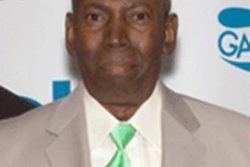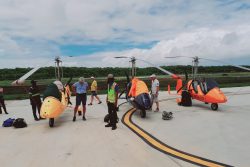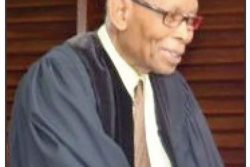When I was first approached by Dr. Ivelaw Griffith, Vice Chancellor of the University of Guyana, to serve for a year with the AIR (Artist in Residence) programme at UG, I wasn’t sure about what I would be taking on. As I told the VC, and later the Deputy VC Dr. Paloma Martin, I know better than to consider myself an educator, but both of them emphasized that I was not being asked to operate as the conventional teacher, but more as a provocateur, or presenter, of discussion to do with the arts and, perhaps, some topics of my choice, and that was how I went into it.
Whatever trepidation I had fell away from my very first involvement with AIR at the institution’s Christmas gathering at the Turkeyen campus which was a totally musical one for me and a relaxed one indeed as the UG crowd took over the singing of the songs from the first song the musicians and I played; we were off and running – no blackboard, no formal lecture, not a dunce cap in sight. Later, there were even higher points, including the Seawall Bandstand performance, a show in Anna Regina, a blazing night with the Tain crowd in New Amsterdam, and a similar jam at Linden a few weeks later.
Apart from the immediate response of a crowd to music, I have also come as close to teacher as I wish to be in some more “educator” type presentations, at Tain and Turkeyen, with some thoughts on arts careers, and I came away from those sessions intrigued by the comments or questions from the gatherings. I had expected the traditional questions – inspiration for songs; remembering lyrics for scores of songs; the joys, or otherwise, of travel; etc. – but there were occasions, sometimes after the session, where encounters with young people took me into areas that surprised me. I particularly recall a young lady at Turkeyen who posed a question I have never been asked – how about the songs that didn’t work, or become popular, how do you deal with that? Following her quiet apology for the query, I hastened to assure her that none was necessary and that in fact the question had never been posed to me but I commented that it was simply part of the game that you had to accept and move on.
Reflecting afterwards about it, however, I realized she had raised an intriguing point. (I wish I had the foresight then to ask the lady’s name so I could credit her now). The truth is that we never truly know why one song hits and the next song you write misses. The Artist and Repertoire folks at big record companies make big noises about picking hits, but time and again they get it wrong. We actually have a plethora of factors influencing popular tastes in everything, including music, so that even experienced people will make prediction mistakes. Very often, we do not know.
I made one of those around 1970 with a Tradewinds song that I was sure would be a big number following our Honeymooning Couple hit in 1968. I had spent a lot of time listening to steelband renditions of popular calypsos, and drew on that to create this song about steelbands “hitting the road” on Carnival day in Port-of-Spain. I used a lot of the diminished chords and augmented chords that pervade pan music with its sliding change of melody and truncated phrasing; I mentioned several of the leading Trinidad pan sides and the favourite streets of the masqueraders; I went into the sensations one feels following a steelband for hours of Jouvert Morning in the streets of the city; I even had a section with the weary band members tramping home all worn out from the days revelry. In Tradewinds we felt the song would tear up Trinidad; indeed, I named the album HIT THE ROAD. Up to today, listening to the song again as I write this, I am at a complete loss to know why it flopped. To my knowledge, no Trini radio station pushed it. No steelband played it; not one. My prized creation was a dud, and I still can’t tell you why; it is pan music extant.
So, to the lady’s question, you can never tell the hit from the flop. Sure, sometimes a song will land so perfectly written, so right for the time, that you know it will take off, and sometimes you’re right, but sometimes you’re wrong. When I wrote Blade O’ Grass, I knew it was a good song, but the level it reached was not something I foresaw. When President Burnham asked the Guyana office in Toronto for 50 copies of the song, I had an inkling, but even that did not tell me what was coming.
By contrast, about three years after Blade O’ Grass, following the election disturbances in Georgetown, a prominent government person here called me in Toronto to ask me to write a song on the matter of bridging the ethnic divide. He was looking for another Blade; I had to tell him it doesn’t work that way but I agreed to give it some thought. About a week after I had a brainwave to write a song using cricket as a metaphor, so without using the word “race” at all, I wrote a song about the need, in a cricket game, to have both Hooper and Chanderpaul playing, in order to win, and the need for “curry to team up with metemgee”. I even put the metaphor in the pavilion, with both Indian and African dress. I felt I had hit a six with the song. In fact, a DJ in Antigua told me it was the best calypso he had heard in years – the double meaning; the racial healing song without mentioning race. I thought, ah ha; this is a hit. And then, like yesterday, I remember coming to Guyana (Bernard Ramsay had arranged for us to play on the road in Mash for DDL) and we played the song at Pegasus Poolside. Sure hit, I thought. The song died like a wounded duck. I had misread Guyana completely. After the horrors in Georgetown, folks didn’t want to hear about ethnic healing, I guess. Another sure hit flopping.
I had another one after moving back here and hearing all these tremors about the purported Brazil population that was in the offing for Guyana, and I put together a kaiso called Oi Brazil using the traditional humour by pointing out that soon Guyanese politicians would be taking Brazilian lessons, a Brazilian would be elected as the Mayor of Bartica, and Freddie Kissoon’s column would appear in Portuguese. Again, amusing story, current topic, but another flop.
I still have a few AIR engagements coming up for UG with my local musicians (Oliver Basdeo; James Jacobs; Colin Perreira), including possibly one in Lethem, but don’t come to them expecting to hear Hit The Road, Oi Brasil, or Hooper and Chanderpaul. And also don’t bother asking me why those songs died; I do not know.










